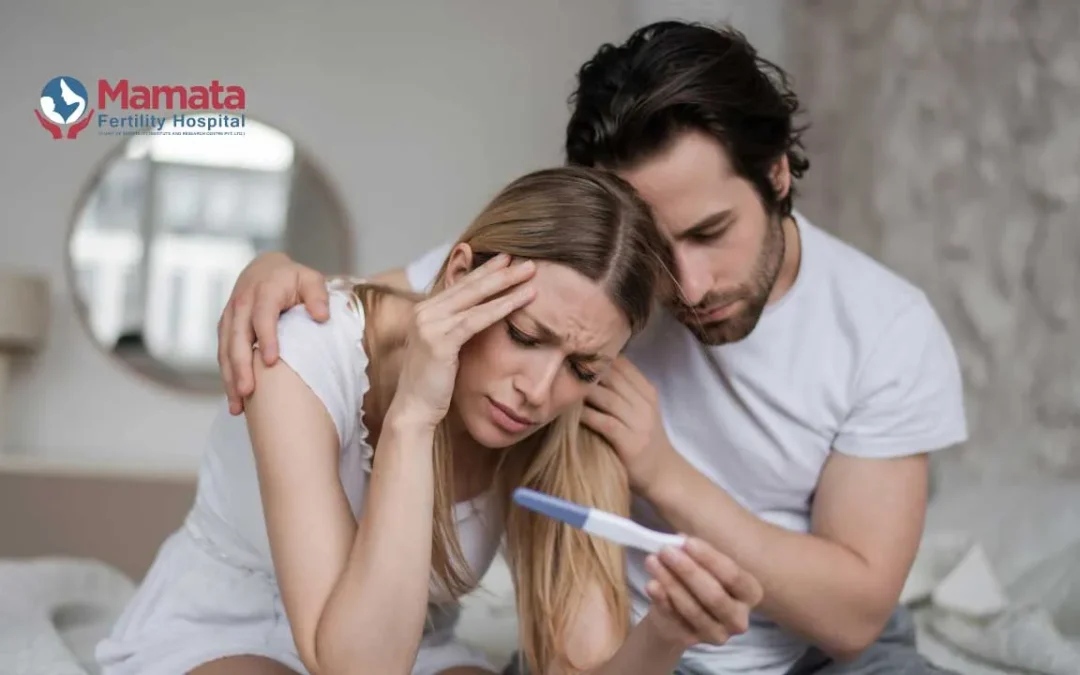Endometrial Cancers
At Mamata Fertility Hospital in Secunderabad, we believe that educating our patients is key to their well-being. Endometrial cancer, a common gynecological condition, can feel intimidating to understand, but with the right knowledge, you can take proactive steps toward your health.
This guide provides clear, easy-to-follow details about what endometrial cancer is, its causes, symptoms, treatments, and ways to support your body through the process.
For Appointments, Please Call:
More On Endometrial Cancer
What is Endometrial Cancer?
Endometrial cancer occurs when the cells that form the lining of the uterus, called the endometrium, start growing uncontrollably. The uterus is the part of a woman’s reproductive system where a baby grows during pregnancy.
Most endometrial cancers are adenocarcinomas, which means they typically start in the glandular cells of the endometrium. While it can occur at different stages of life, it is most common in women who are postmenopausal—typically after the age of 50.
Think of the endometrium like the inside of a balloon that prepares every month to host a developing baby. If no baby comes along, the lining sheds (as part of your period). But sometimes, due to certain triggers, the cells in the lining start growing in ways they shouldn’t. This is when cancer can develop.
The good news? If caught early, endometrial cancer is very treatable.

Causes and Risk Factors
The exact cause of endometrial cancer isn’t fully understood, but there are several factors that could put you at a higher risk. Knowing these can help you stay informed about your health.
What Are the Risk Factors?
- Hormonal Imbalance
Estrogen and progesterone are the two main hormones in the female reproductive system. If estrogen levels are too high compared to progesterone, it can overstimulate the endometrium, increasing the risk of cancer. For example, women who take estrogen-only hormone replacement therapy (HRT) without progesterone face higher risks.
- Age
Most cases are diagnosed in women between the ages of 50 and 70, often after menopause.
- Obesity
A higher body fat percentage can lead to excess estrogen production. For example, studies show that obesity can increase the risk of developing endometrial cancer by two to four times.
- Genetics
If close family members (like your mother or sister) had endometrial or colorectal cancer, your likelihood of getting it increases. Genetic syndromes like Lynch syndrome also increase risk.
- Other Medical Conditions
Women with diabetes, polycystic ovary syndrome (PCOS), or hypertension seem to have a slightly higher chance of developing endometrial cancer.
- Never Being Pregnant
If you’ve never carried a pregnancy to term, your risk of endometrial cancer may be a bit higher.
- Late Menopause
If your periods continued past the age of 55, this lengthened exposure to estrogen increases your risk.
Note on Prevention
While not all risks can be controlled, keeping a healthy weight, following balanced diets, and exercising regularly can help lower the chances of developing endometrial cancer.
Symptoms and Diagnosis
Recognizing the signs early can make a huge difference in outcomes. Although the symptoms of endometrial cancer can overlap with other women’s health conditions, here’s what you should keep an eye on.
Common Symptoms
-
- Unusual Vaginal Bleeding: The most noticeable symptom. For postmenopausal women, any bleeding—even light spotting—is a possible warning sign. For premenopausal women, irregular or heavy bleeding between periods can be concerning.
- Pelvic Pain: Persistent pain in the lower abdomen or pelvis.
- Unusual Discharge: Watery, blood-tinged, or smelly vaginal discharge.
- Pain During Urination or Intercourse: These symptoms can reflect later stages of the disease.
- Unexplained Weight Loss or Fatigue: Which could indicate any type of cancer.
How is it Diagnosed?
When you visit Mamata Fertility Hospital, your doctor will conduct tests to confirm the presence of endometrial cancer. These may include:
- Pelvic Exam: Your doctor will look for abnormalities in your uterus, ovaries, and nearby tissues.
- Transvaginal Ultrasound: This imaging test lets doctors see the thickness of the endometrial lining.
- Endometrial Biopsy: A small sample of uterine lining cells is removed and tested under a microscope.
- Hysteroscopy: A tiny camera is inserted into the uterus to look for abnormal growths.
Early and accurate diagnosis is key to successful treatment.
Impact on Health and Daily Life
A diagnosis of endometrial cancer naturally brings with it emotional and physical challenges. While treatments often aim to eliminate cancer, the process can affect daily life as well.
Physical Impact
-
- Fatigue: Due to both the disease and treatments like chemotherapy.
- Hormonal Changes: Surgical treatments like a hysterectomy may lead to a sudden drop in hormones, causing hot flashes, mood swings, or weight changes.
- Digestive Changes: Treatments may lead to temporary nausea or dietary adjustments.
Emotional and Social Impact
-
- You might feel overwhelmed or anxious, questioning how cancer will affect your family or work. Consider reaching out to support groups or counseling services—we’re here to help connect you with resources.
Remember, many women recover from this illness fully and go on to live active, fulfilling lives.
Treatment and Management Options
Fortunately, there are multiple effective treatments for endometrial cancer available. Your doctor at Mamata Fertility Hospital will assess your health condition and suggest a personalized plan.
Standard Treatments
- Surgery
-
- A hysterectomy (removal of the uterus) is the most common treatment for endometrial cancer.
- If there’s a chance cancer has spread, surgeons might also remove the ovaries, fallopian tubes, and lymph nodes.
-
- Radiation Therapy
-
- High-energy rays kill cancer cells. This is often recommended after surgery to stop any remaining cancer cells from multiplying.
-
- Chemotherapy
-
- Medicines delivered either via IV or as pills work to kill cancer cells or shrink tumors.
-
- Hormone Therapy
-
- If cancer uses hormones to grow, drugs like progestins might help block their effects.
-
- Targeted Therapy
-
- Newer treatments zero in on specific cancer markers to slow its spread with minimal damage to healthy tissue.
-
Lifestyle and Support Recommendations
Coping with cancer involves more than just treating the disease. Taking care of your mind and body as a whole is important.
Healthy Habits
-
- Eat nutrient-packed Indian staples like turmeric, lentils, and seasonal vegetables to support your immune system.
- Include activities like yoga or brisk walking to boost your energy.
Emotional Wellness
-
- Cancer can lead to stress; mindfulness or meditation might help.
- Consider joining a women’s health support group to connect with others in your position.
Follow-up is Key
Once you’re cancer-free, regular screenings are vital in preventing recurrence or catching anything early.
Frequently Asked Questions (FAQs)
1. Can young women get endometrial cancer?
Yes, but it is much more common in women over 50. However, younger women with PCOS, obesity, or family history are at risk, too.
2. Is endometrial cancer curable?
When detected early, it is highly treatable, with a 5-year survival rate of over 90% in early-stage cases.
3. How can I prevent endometrial cancer?
Maintaining a healthy weight, staying physically active, and managing hormonal health can reduce your risk significantly.
4. Will I require a hysterectomy?
Surgery is common for treating endometrial cancer, but every case is different. Your doctor will explain your options and help you make an informed choice.
5. Can I have children after treatment?
If detected in its early stages, some fertility-preserving treatments are available. It’s best to discuss all possibilities with your doctor before beginning treatment.
At Mamata Fertility Hospital, we understand how overwhelming a cancer diagnosis can feel. That’s why we’re here to provide not just the latest treatments, but also compassionate support.
Whether you’re seeking advice, screening, or advanced care, we’ll walk with you every step of the way. Don’t hesitate to schedule a consultation today. Together, we’re committed to your health and recovery.
Reviewd By

Dr Aarti Deenadayal Tolani
Clinical Director, Scientific In-Charge & Fertility Consultant
MBBS, MS ( OBGYN), FICOG
Expert in Reproductive Endocrinology, Infertility, Advanced Gynaec Ultrasound, and Faculty at Mamata Fertility Hospital.
Blogs and Articles

Differences Between Sterility and Infertility
Infertility is difficulty conceiving, often treatable. Sterility is the permanent inability to conceive. Know the difference, seek help.

Can Yeast Infection Cause Infertility?
Yeast infections don’t cause infertility. While discomfort and changes in cervical mucus may affect conception temporarily, proper treatment resolves this.

Does Female Masturbation Cause Infertility?
Female masturbation does not cause infertility. It’s a natural, healthy activity with no impact on ovulation, implantation, or conception.
RELATED CONDITIONS
- Uterine Cancer
- Cervical Cancer
- Ovarian Cancer
- Fallopian Tube Cancer
- Breast Cancer
- When to Consult Infertility Specialist?

